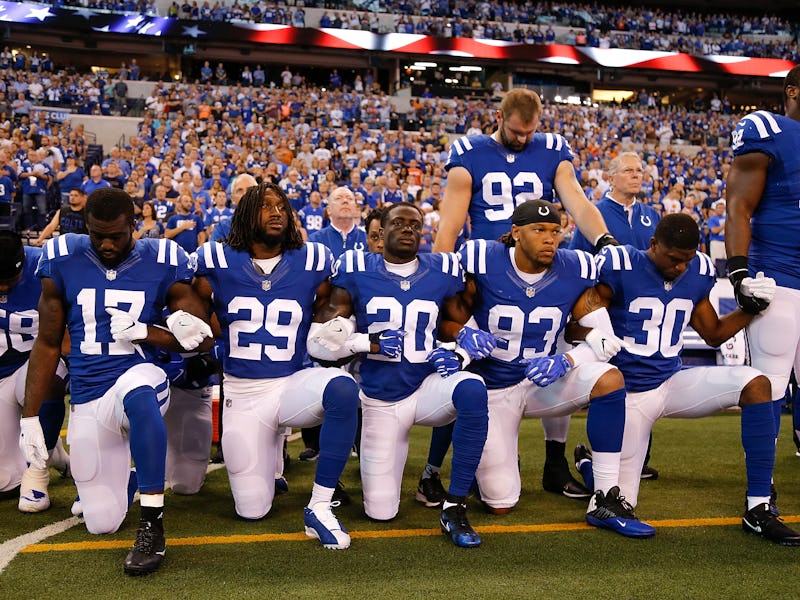Why Trump's War on the NFL is a Powerful Psychological Distraction
Science explains.

To say that President Donald Trump’s time in office has been plagued with controversy is something of an understatement at this point. The latest snafu, of course, has been his tweeting tirade this weekend against the NFL and its support of Colin Kaepernick and other players’ right to protest. The former 49ers quarterback is at the center of a movement that’s seen players take a knee during the national anthem to protest police brutality and racial injustice.
And although the tweet tantrum has taken over the national spotlight this weekend, with high profile sports figures and celebrities coming out to vocally oppose Trump’s comments, it’s also prompted criticism that this is all a big distraction from the greater issues at hand.
Even on Fox News Sunday, conservatives were quick to point out that the President has bigger fish to fry in the form of giving his attention to a budget resolution and crafting a health care plan.
“He’s joined this fight much to his own disadvantage,” Karl Rove, a Bush-era White House adviser, told Chris Wallace. “He’s in the middle of two big fights, and this distracts from it.”
Others like George Takei went a step further.
Whoever he’s trying to distract, his tweeting is having some real consequences, according to science.
Baltimore Ravens players kneel for the American national anthem during the NFL International Series match between the Ravens and the Jacksonville Jaguars at Wembley Stadium in London, England, on September 24.
In an interview with Harvard Business Review, Maggie Jackson, the author of Distracted: The Erosion of Attention and the Coming Dark Age explained how distractions can take up the same mental space as important things, no matter how trivial.
“Most important, though, is how hierarchies of knowledge become flattened,” she said. “When what we pay attention to is driven by the last e-mail we received, the trivial and the crucial occupy the same plane.”
With a GOP healthcare plan in a constant state of flux, the ongoing investigation into whether the Trump campaign conspired with Russia, and the near-fever pitch conflict that’s arisen between the U.S. and North Korea, Trump is weathering plenty of real problems that impact his presidential brand the longer they stay in the public consciousness. And although the NFL beef has seemingly completely backfired for Trump, the issue of players taking a knee during the national anthem had been largely viewed as an inappropriate gesture by many Americans; a sentiment Trump was clearly interested in harvesting to boost his popularity. Even after going askew, jumping on an issue like taking the knee could pivot the conversation away from nuclear weapons, Russian collaborating, and millions of Americans losing their healthcare.
A commentary reviewing the findings of several scientific studies on the effects of distraction in the journal Frontiers in Psychology found that distraction can “result in reduced fidelity of details” retrieved from long term memory. Fergus I. M. Craik of the Rotman Research Institute of Baycrest in Toronto also writes that distraction, especially if it captivates you, it will impact your ability to stay focused on the task at hand.
“If the distracting stimulation requires responses (i.e., dual-task performance), more attention will be required and more disruption will ensue,” he writes.
Let’s put this line of thinking into a real-world scenario. Maybe you perceive that Donald Trump isn’t handling the situation with North Korea well (a recent NPR/Ipsos poll showed that 51 percent of Americans distrust Trump’s ability to deal with the North Korean government), and you decide to brush up on the issue and open an article about the increasingly fraught relationship between the two nations. Then you’re distracted by a barrage of Trump tweets about the NFL that elicited an emotional response because they offend your beliefs about freedom of expression. You feel the need to exert cognitive efforts to write your own tweet in response, and now you’re reading other people’s responses too. It’s been about 40 minutes — what was that thing you were reading about when you first opened your phone?